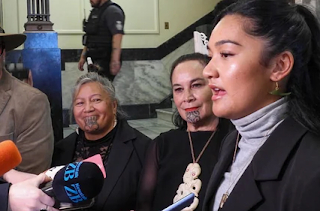Hana-Rawhiti Kareariki Maipi-Clarke's Bold Protest: Ripping Up the Treaty Bill and Leading Haka in Parliament
New Zealand's Parliament was rocked by a dramatic moment on Thursday, as the youngest-ever MP, Hana-Rawhiti Kareariki Maipi-Clarke, made her mark once again with a bold and emotional protest. During a heated debate on the Indigenous Treaty Principles Bill, the 22-year-old Māori MP ripped up a copy of the bill in the chamber and launched into a powerful haka, a traditional Māori war dance, drawing widespread attention.
 |
| Hana-Rawhiti Maipi-Clarke rips up Treaty Bill, leads haka |
The scene quickly became a viral sensation after it was captured on video, showing Maipi-Clarke’s dramatic act of defiance in front of the nation’s lawmakers. As the Te Pāti Māori MP tore up the bill, which was being discussed in Parliament, she channeled the emotional weight of her ancestors and the struggle of Māori communities, expressing her deep dissatisfaction with the proposed legislation.
But it wasn’t just the symbolic gesture that caught the eye of viewers—Maipi-Clarke’s haka performance, charged with passion and purpose, was an invitation for others to join in. Soon, a number of her fellow MPs and even some spectators in the gallery rose to their feet, engaging in the powerful dance alongside her. The haka, historically used to assert strength and solidarity, transformed the otherwise routine session into a poignant statement of unity and resistance.
The powerful moment led to a temporary suspension of the House session by Speaker Gerry Brownlee, who was left with no choice but to pause proceedings as the emotional display unfolded.
A Bold Stand Against the Treaty Principles Bill
Maipi-Clarke’s actions were aimed directly at the Indigenous Treaty Principles Bill, which was under discussion at the time. The bill has sparked considerable debate within New Zealand, especially among Māori communities, who view it as insufficient in recognizing and upholding their rights. The Te Pāti Māori party, to which Maipi-Clarke belongs, has been vocal in opposing legislation they feel undermines the Treaty of Waitangi—a foundational agreement signed between Māori chiefs and the British Crown in 1840 that guarantees Māori rights and protection.
For Maipi-Clarke, this wasn't just a political gesture; it was a deeply personal and cultural statement. By tearing up the bill, she sought to send a message that Māori people will not passively accept legislation that they believe falls short of honoring their treaty rights. The haka, a traditional Māori dance symbolizing strength, unity, and defiance, underscored the intensity of her protest, signaling a demand for a more meaningful commitment to Māori sovereignty and equality.
The Aftermath and National Response
The video of the session quickly gained traction on social media, sparking conversations about Māori rights, the ongoing struggle for justice, and the role of young political leaders in shaping New Zealand’s future. While some critics questioned the disruption of parliamentary proceedings, many others hailed Maipi-Clarke for her courage and for using her platform to voice the concerns of Māori people.
Maipi-Clarke’s actions come at a time of increasing awareness about the need for greater acknowledgment of Māori culture and rights within New Zealand’s political and legal systems. As the youngest MP in the country, her bold stance is seen by many as a reminder of the urgency with which New Zealand must address the inequalities faced by its indigenous population.
Despite the controversy, Maipi-Clarke has remained resolute in her commitment to fighting for the Māori people. As a member of Te Pāti Māori, she continues to challenge the government on issues ranging from environmental protection to social justice, while advocating for the Treaty of Waitangi to be honored in full.
For now, the images of Hana-Rawhiti Kareariki Maipi-Clarke tearing up the bill and leading the haka in Parliament have left an indelible mark on New Zealand's political landscape—marking her as a leader unafraid to stand up, speak out, and defend the rights of her people with passion and conviction.
Comments
Post a Comment